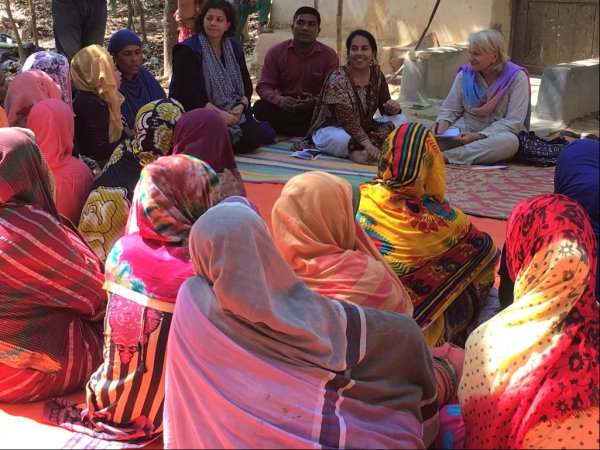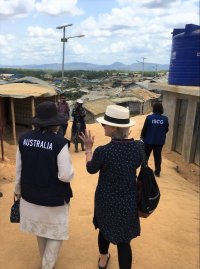Bangladesh is an example of a natural disaster-prone country trying to ensure that no one is left behind. It now has strong economic performance. However, 25% – or 40 million people – live below the poverty line and inequality is increasing.

Listening and sharing experiences with Rohingya women in Cox’s Bazar refugee camp
The Bangladesh government has put in place significant efforts to protect its most vulnerable citizens. It has regulated to ban child marriage that is driven by social norms and poverty. In 2018 the target was set for no marriages of children under 15 by 2021 and for those under 18 by 2041.
However, problems of policing compliance, the lesser value placed on girls, sexual harassment and family poverty mean these targets are not likely to be met.

Meeting participants in an Australian-supported female community empowerment project in Dhaka in 2019.
The government is also aiming to end the exploitation of child labour. In 2019 the minimum age for light work was raised from 12 to 14. However, as donor nations and big brand buyers demanded higher standards of safety, shorter hours and better conditions, the clothing and textile sector has transferred most of the work to the informal unsupervised sub-contractor sector where 80% of workers are young girls.
Young girls are 75% of all domestic workers living beyond official oversight in private houses. UN agencies report the frequent transitioning of these girls into the sex trade.
Young women are 75% of all domestic workers living beyond official oversight in private houses. UN agencies report the frequent transitioning of these girls into the sex trade.
It is perhaps surprising to find that more girls than boys are enrolled in primary school in Bangladesh. However, at or before puberty those from impoverished families leave to marry or care for family members, too often leading to rights abuse, early pregnancy, injury and unskilled, unsafe informal work. A third of all girls become pregnant before 18.
Tens of thousands of the poor also leave Bangladesh, joining the estimated 22 million from across the ASEAN countries seeking jobs or better pay through temporary migration. They go for three to 10 years and are unskilled, too-often illegal workers, trapped through debt in the lowest paid and most dangerous jobs in nearby countries or the Middle East. They work in domestic households, on building sites, in agriculture, fishing, hospitality and in brothels. Some are trafficked and become enslaved. The UN estimates, the number of people now forced into unpaid work is the highest ever recorded in human history. Australia enacted the Modern Slavery Act 2018 to try to deal the problem.

Receiving a briefing at Cox’s Bazar
These millions of temporary unskilled workers, including people from Sri Lanka, the Philippines, Indonesia, Nepal, and Cambodia, Bangladesh, remit most of their earnings to support their families, while their children are left behind without parental protection, exposed to potential abuse, a sense of abandonment and alienation.
While across the region the impoverished leave school early, many countries also experience a chronic shortage of skilled labour. Bangladesh’s skills shortage costs them some $5 billion annually, paid to import a skilled workforce.
So, does having more women elected equate to a greater protection of women’s rights and empowerment and a skewing of resources towards more spend on social services, like education? Bangladesh is an example where 50 non-elected seats are reserved for women; however, no quota guarantees that the women selected by their patriarchal parties can or wish to introduce a feminist agenda.
Likewise, having a majority of tertiary-educated women has not led to the eradication of a pay gap or to significant numbers of women in the senior positions in government, business or civil society.
Significant shifts in the numbers of women in leadership, the economic self-sufficiency of many more women and the eradication of gendered abuse and domination will probably only come when gender equality is no longer seen as a zero-sum game.




